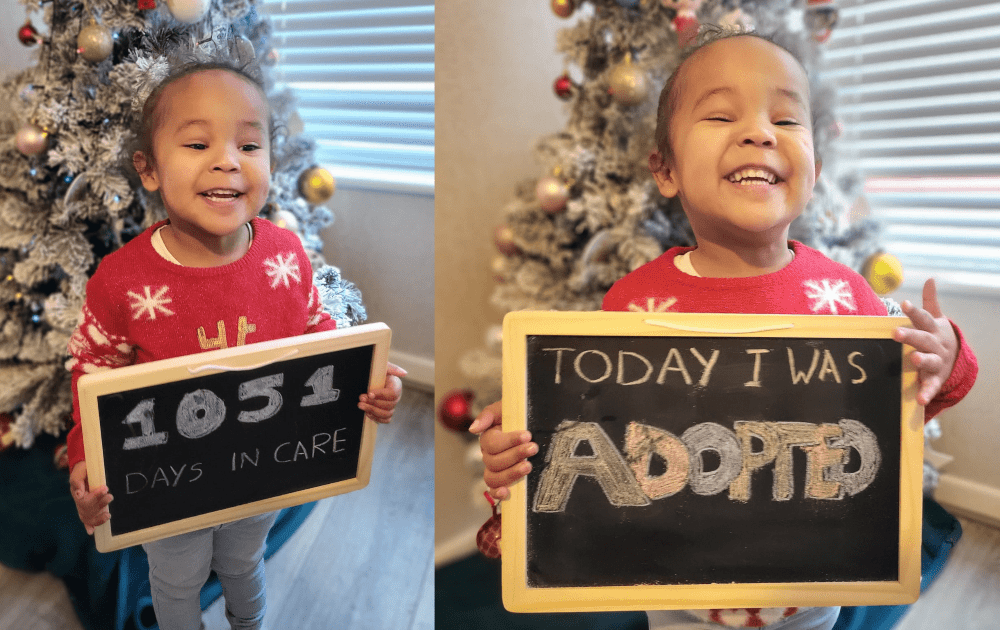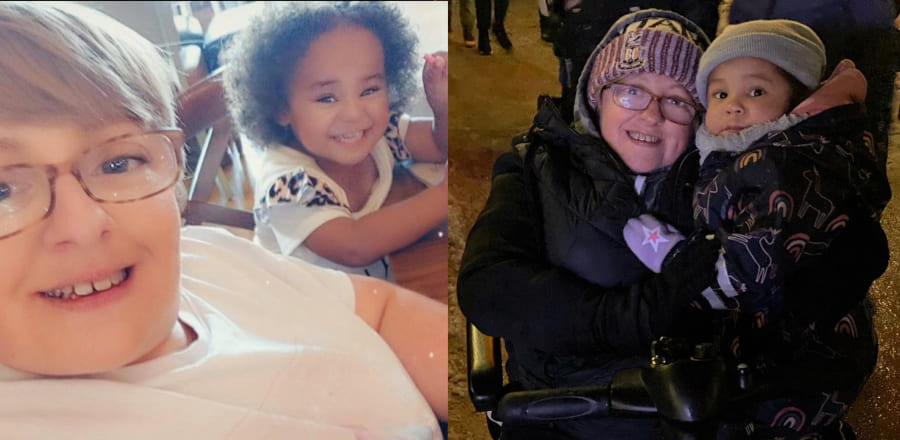 After an application process that took months, to pursue a dream she’d harboured for much longer, Hayley is now just waiting on the paperwork. The family court approved her adoption of three-year-old Shirley a few weeks ago, so she’s legally her mum. Nevertheless, she’s looking forward to getting the certificate of adoption and seeing it in writing.
After an application process that took months, to pursue a dream she’d harboured for much longer, Hayley is now just waiting on the paperwork. The family court approved her adoption of three-year-old Shirley a few weeks ago, so she’s legally her mum. Nevertheless, she’s looking forward to getting the certificate of adoption and seeing it in writing.
Hayley, 33, who has brittle bone disease, understandably feels proud and relieved. She’s adopted the foster child she loves. She’s overcome doubt and fear of disappointment and, in doing so, has transformed both their lives.
“My disability hasn’t stopped me fostering or adopting,” she said. “I wasn’t sure about my health but I asked the social workers and said ‘be honest’ and they were.
“If you have a disability, go for it, ask, you never know. They want you to foster and adopt, there are so many children who need a family.
“I’d do it all again in a breath. I don’t want to be living my life on ‘what if’. I’m so glad I put myself forward.”
I don’t want to be living my life on ‘what if’. I’m so glad I put myself forward.
Before she adopted Shirley, Hayley had experience of fostering. Her mum, Carol, was approved to become a foster carer in 2010, when Hayley was 21. Along with dad Paul and her brother and sisters, Hayley was assessed and approved for fostering as a member of the fostering family.
Carol has fostered dozens of children and young people over the years. Early in 2020, she began fostering six-week-old Shirley when her birth mother could no longer care for her. She quickly became part of the family, though after several months she was put up for adoption.
“We all adored her,” Hayley said. “We were happy when her adoption started – of course, we wanted her to have a ‘forever home’. It was sad too – we wished her ‘forever home’ was with us.”
While the family continued to care for their foster child – the adoption process would take months – Hayley reached a decision. Helping to foster Shirley led her to acknowledge to herself that she wanted to adopt a child. In addition, she realised that she hadn’t acted on her feelings because she’d made an assumption about her disability.
“Adoption had always been at the back of my mind,” she said, “but I think I was worried that I’d be turned down because of my health. I decided I had to at least ask what my chances were.”
Hayley found the courage to ask the opinion of the family’s supervising social worker, Rachael from National Fostering Group. The honest and positive response she got encouraged her to begin her application.
“It’s a slow process and this wasn’t helped by COVID. It was a relief when I had my medical and it was clear that my disability wouldn’t stop me from becoming an adoptive mum.”
We wanted to be her forever home… From that moment, my heart was set on Shirley, adopting Shirley.
Unexpectedly, Shirley’s adoption fell through and Hayley knew this was the opportunity she’d been longing for.
“We wanted a ‘happy ever after’ for her. We wanted to be her forever home. We’ve always been part of her life, we’re all she can remember. From that moment, my heart was set on Shirley, adopting Shirley.”
In the days before her 3rd birthday, after 1051 days in foster care, Shirley’s adoption was finalised by the family court. “It was a stressful wait and it was hard keeping this from Shirley.”

Hayley has worked as a nursery nurse for the last 17 years. She’d moved out of her parent’s home into a rental during the adoption process. She now lives there with her daughter and is in the middle of buying a home for them.
“Because of my disability, there are things we have to do differently. Like, we sit down to go down the stairs because it’s safer for both of us. I’m only four feet tall but I can still pick her up and carry her. As new challenges come up, we’ll find a way to manage them.
“I have a mobility scooter – she thinks it’s funny to ride on it! She says ‘Mummy, you’re small’ and I’ve explained that it’s because I have poorly bones.
“Nothing is a secret. As much as I know, she’ll know, and she’ll ask questions that I’ll answer as honestly as I can. From the beginning, we’ve always told her about her birth mum and explained that she wasn’t able to look after her.
“She always called my mum Nanny. While we were going through the adoption process, she spontaneously started calling me Mummy. I didn’t ask her to. My social worker asked why I hadn’t. It was because I didn’t want to let her down, for her to feel let down, if the adoption had fallen through.”
While we were going through the adoption process, she spontaneously started calling me Mummy.
As Shirley has mixed heritage, Hayley is preparing for questions about this too. “Brown and white skin doesn’t mean anything to her now but it will later,” she said. “We’ve got story books where the characters have a range of skin colours, as well as who are able-bodied or have disabilities.
“We think she’s Afro-Caribbean but we’re not absolutely sure. I’ve researched what she needs now – how to do her hair, how to take care of her skin type. She can explore her heritage for herself later and I’ll help when she’s ready.
“I’ve been going to an online support group for foster carers who take care of children from different cultures, including refugees. This has been very useful and my social worker helped me find information too.”
Shirley’s adoption was supported by three social workers, all pulling together – from our local fostering agency, the local authority, and the adoption agency. Adoption doesn’t have the same level of support as fostering, but as a new adoptive mum, Hayley will be supported by a social worker for the next two years.
She’s got plenty of support from her parents and siblings too. As they’re a close family, Shirley sees her Nanny, Grandad and the others several times a week. “Being part of our big, extended family is normal for her,” Hayley said.
While her birth children have all left home now, Carol and Paul still have an adopted son, Ryan, at home. Coincidentally, they also originally fostered Ryan when he was a baby. The couple still foster children through National Fostering Group.
This is symbolic of the foster child’s place in the family and the enduring love that is often the norm in fostering households.
Fostering a child doesn’t automatically lead to being able to adopt them and. Shirley and Ryan’s stories are not common, though it’s possible.
Many foster children will, however, stay with the same foster carers until they are ready to leave home at 18 or 21. This is known as long-term fostering and attracts many benefits that adoption doesn’t – like a high level of support, free training, a generous fostering allowance, and more.
It’s also worth noting that fostering a baby or toddler isn’t as common as caring for other age groups.
Fostering vs adoption
Some foster parents who have long-term placements in place can apply to the family court for a certificate of permanence. This ensures your foster child stays with you until they’re an adult. A certificate of permanence will only be issued if the court says it’s in the child’s interest.
This is not the same as adoption because foster carers use what’s known as therapeutic fostering, which is a different process to parenting your own child. You can discover more about this topic by reading our article on why we talk to foster carers about adoption.
We’ve had instances where foster parents have adopted their former foster children as adults. This is symbolic of the foster child’s place in the family and the enduring love that is present in many fostering households.
What Hayley said is true – many children need safe homes where they can thrive. Every day in the UK, 77 children come into care – but the UK doesn’t have enough foster carers to cope. Can you help?
Every day in the UK, 77 children come into care – but the UK doesn’t have enough foster carers to cope. Can you help?
We welcome applications from people of all ethnic, cultural and religious backgrounds, physical abilities and the LGBT+ community. You can be single, married, a homeowner or a tenant. You can foster with a disability. Your ability to care for and nurture a child is what really matters.
In return, we offer:
If you’d like to discover more about your suitability, try our quick Can I Foster? tool or, if you’d like a chat now, get in touch.